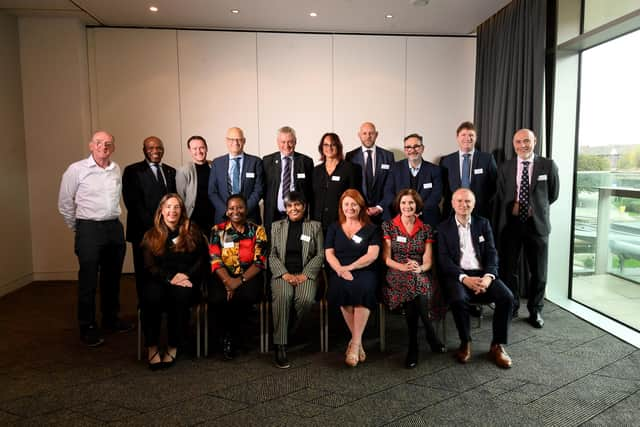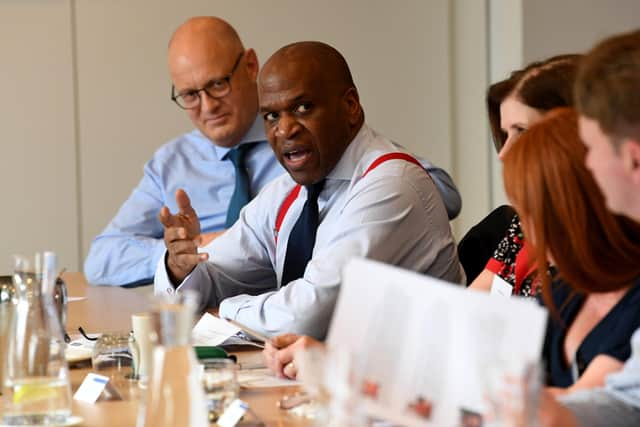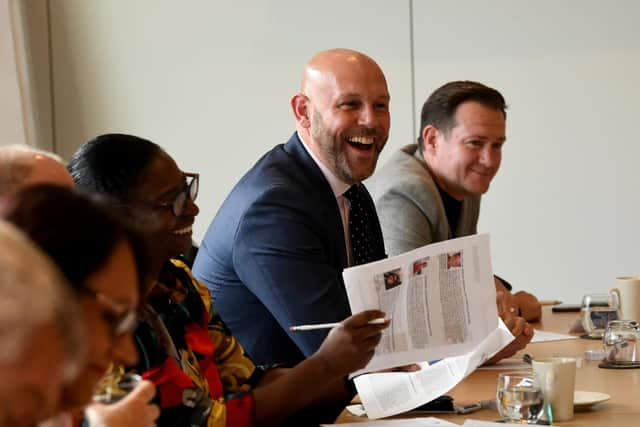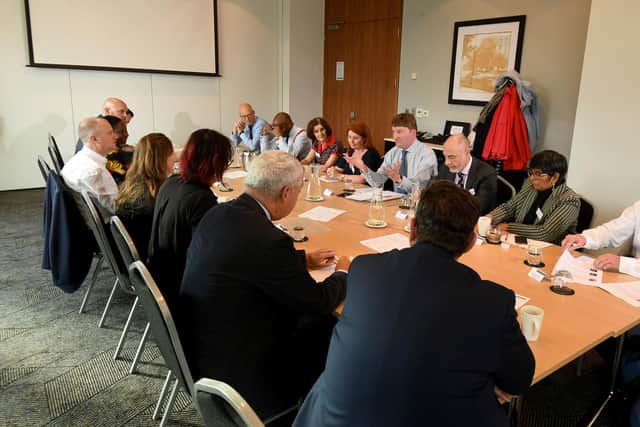Investing in sport and culture can transform Yorkshire's economy, Turner & Townsend roundtable is told
Leading business figures stressed that public and private sector partnerships should take a long term approach to supporting sport and the arts in order to secure lasting economic change. The participants also highlighted the importance of being aware of culture sensitivities in order to make events welcoming to all.
The roundtable event, which was hosted by The Yorkshire Post and Turner & Townsend, analysed the role culture and sport can play in supporting the regeneration of Yorkshire’s economy.
Advertisement
Hide AdAdvertisement
Hide AdThe debate, which was held at DoubleTree by Hilton Hotel in Leeds and chaired by Greg Wright, the deputy business editor of The Yorkshire Post, featured leading figures from Yorkshire’s business community.
James Mason, the chief executive of West & North Yorkshire Chamber of Commerce, said: "Covid 19 gave us an insight into a life without both sport and culture. We lived life in grey for a couple of years. Sport and culture can pull communities back together again like no other activities."Mr Mason said the fact that Yorkshire will host games in the Rugby League World Cup- and hosted games in the UEFA Women's Euros - showed the global significance of the region. However, he was concerned about accessibility to sport on various levels; the fact remains that some children and parts of the community find it hard to access sport, which may, in part, be due to issues linked to transport and cost.
"For example, how do children get to watch a game at Elland Road, Valley Parade or Yorkshire cricket if they have no means of access, have no one to take them or prices are unaffordable now more than ever?”, he said.
He said it was also important to make sporting and cultural events accessible to a wider range of communities, for example, by being culturally sensitive. Football sponsorship and in stadia, for example, has historically been dominated by alcohol and gambling, he said.
Advertisement
Hide AdAdvertisement
Hide AdHe also highlighted trends in the US, where major corporations are backers of sport and culture and very evident at college level. He suggested this creates a level of social mobility and opportunities that might not ordinarily exist for under represented communities.


"One of the most important issues we need to work together to resolve is how sport and culture is funded."
Siobhan Atkinson, the chief executive of the Huddersfield Town Foundation, highlighted the ways the foundation is opening up football to a wider range of people, including women from south Asian backgrounds, who might not have considered attending a game.
The foundation held a special event to welcome women from south Asian backgrounds to the John Smiths stadium in Huddersfield and it has also considered what barriers need to be overcome to make it more accessible for them. The feeling created on a first visit is really important if we want them to return, she said
Advertisement
Hide AdAdvertisement
Hide AdMs Atkinson said: "We really need young people to dream big. I get really frustrated when I hear young people say, "I only live in Kirklees'.


"I say, what's the only?"
"We need to keep people here in our region to seek out opportunities. At the football club, for example, there are not just roles on the pitch. You could become a chef, a lawyer or a marketing officer. Habits you pick up at five or six years of age stay with you for life so football needs to inspire from an early age.
"Sport should not try to separate itself from culture and heritage. We mustn't think in segments; we must bring culture and sport together."
She acknowledged that it can be hard to plan long term because of the need to find sources of funding because "people expect miracles after two years" which showed the importance of long term private sector support.
Advertisement
Hide AdAdvertisement
Hide Ad

Tom Riordan, the chief executive of Leeds City Council, said he had been a life-long lover of team sports which gave children the opportunity to learn by being a part of something bigger than themselves.
"Culture and sport are more important than anything else in creating a sense of place,'' he said. "There is definitely something unique about our sport and cultural institutions. Leaders can emerge to greatness from sport and culture.
"It's also sport and culture that makes us smile the most. In Leeds, we have theatre, opera, ballet, sport and the arts, with institutions like the Northern School of Contemporary Dance in Chapeltown producing world class dancers.
"Smaller organisations are also significant, notably Chapel FM in Seacroft and Slung Low in Holbeck. There is a real sense of optimism around the city leading into 2023. Over the next decade, we are likely to see the emergence of a new generation of brilliant musicians, dancers and sports people."
Advertisement
Hide AdAdvertisement
Hide AdHe stressed that many of the institutions which have supported the growth of arts and culture in the region were not developed through decisions made in Whitehall but choices made locally, through organisations such as Yorkshire Forward and local authorities.
Dan Bates, the chief executive of Sheffield Theatres Trust, said: “It's all about the people and the audiences you attract. There is so much going on all the time.”


He said that sport and cultural success can be agents for change and there must be a focus on the skills that people need to support the development of sporting and cultural attractions to boost the economy.
He added: "It's not just about the big and shiny but small and beautiful."
Advertisement
Hide AdAdvertisement
Hide AdSharon Watson, the CEO and Principal of Northern School of Contemporary Dance, said the school's building in Chapeltown looks across to a community which has produced some of the best footballers in the Premier League.
"We love that connection with the community and role models from the school can help to shake things up. It's so important that talent is visible."
As a result, talented local young people who might have considered becoming footballers have now taken up dance, which is a sign that the school and arts and culture can change lives.
She also stressed the need for long term financial backing for organisations like the school in order to achieve sustainable growth.
Advertisement
Hide AdAdvertisement
Hide Ad"We have got the talent here but we need to keep growing. You need to invest in young people's journey."
Surriya Falconer, the vice chair of The Sheffield Culture Collective, said: “We all know that sport and culture helps to improve lives.
"But we need to recognise it’s a circular thing, it’s not just how sport and culture can support the regional economy but also how the public and private sectors can recognise the economic value of sport and culture by investing in it, such circular investment will pay back in spades.
"The Sheffield Culture Collective, which includes private sector members, has been working to improve infrastructure and influence for cultural investment in the South Yorkshire region. The public sector also has a role to play through bold investments. Fifty years ago, Sheffield Council invested in the Crucible Theatre which has been a stunning success, repaying its initial investment many times over. This circular approach, involving the private and public sectors, can lead to big improvements in our towns and cities."
Advertisement
Hide AdAdvertisement
Hide AdDelroy Beverley, the Institute of Directors’ chair for Yorkshire and the North East, said: "Covid exposed society's underlying deprivation vulnerabilities. It shone a light on the haves and have nots. We talk about levelling up but we need to consider what levelling down means."
He said that due to ongoing challenges in transport infrastructure, for example, it could be much harder for people in outlying towns and villages to attend major sporting and cultural events.
"How do you promote investment in sport and culture during a cost-of-living crisis? How do we support important community groups and clubs who struggle to cover their costs? Until we deal with this issue in the truest sense there will always be inequality."
Mr Beverley said he wanted to ensure that the British Library North, at Temple Works in Leeds was accessible to people and families that do not live in Leeds.
Advertisement
Hide Ad